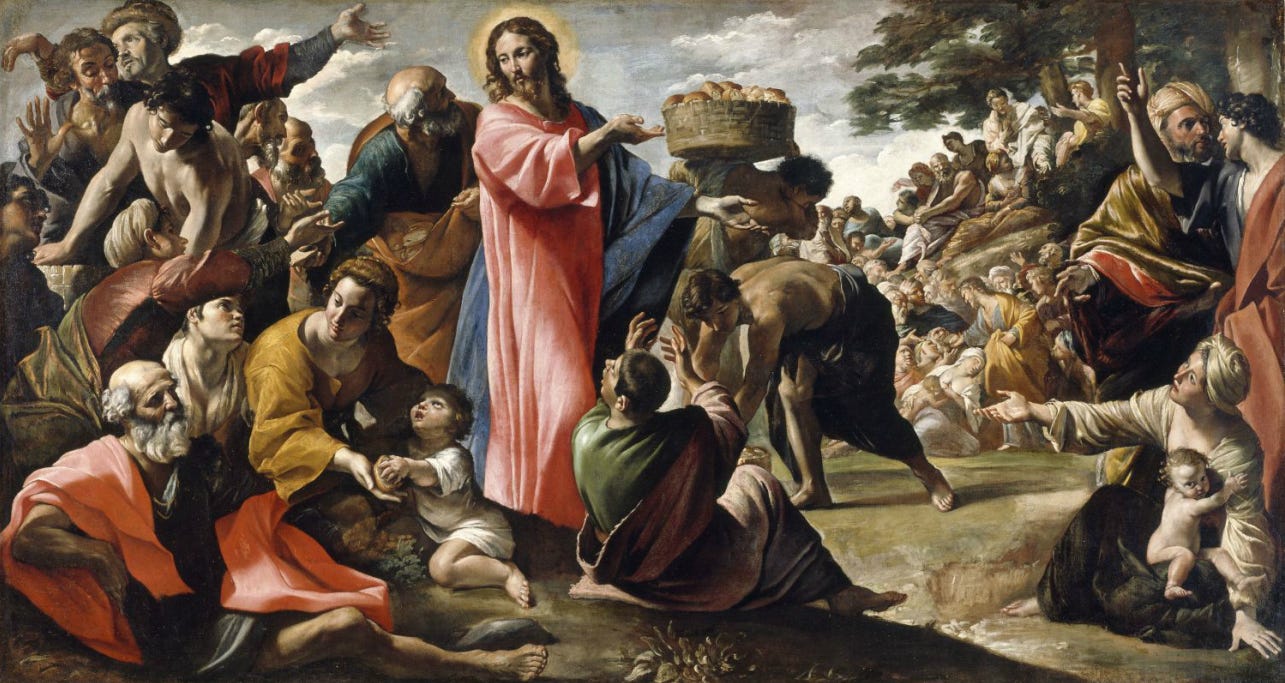Read Along: Sticky Sentiments (Matt. 1–15)
Reading All Four Gospels in September? Discuss What You’re Finding Here

One of the ways to judge the influence of a work of literature is how readily people quote it, how easily they reach for its ideas and formulations to express their own thoughts and feelings.
As we undertake this project of reading through the gospels in a month, I’ve been struck by how many salient ideas pepper every page. With our culture’s drift from widespread biblical literacy I assume this will drop off, but you don’t have to hunt long or far in these first fifteen chapters of Matthew—including the Sermon on the Mount and several parables—to find words and phrases that have become part of our everyday vernacular.
Here’s a decent list of some that stood out to me. As a bonus, I’ve included some movie clips to catch a few of these expressions in action.
The voice of one crying in the wilderness (3.3)
Brood of vipers (3.7)
Baptism by fire (3.11)
Man shall not live by bread alone (4.4)
Blessed are the meek (5.5)
Blessed are the merciful (5.7)
Blessed are the peacemakers (5.9)
Salt of the earth (5.13)
Light of the world (5.14)
City on a hill (5.14)
Not one jot or tittle (5.18)
Eye for an eye, tooth for a tooth (5.38)
Turn the other cheek (5.39)
Go the extra mile (5.41)
Daily bread (6.11)
Where your treasure is, there will your heart be also (6.21)
You can’t serve both God and mammon (6.24)
Consider the lilies of the field (6.28)
Sufficient to the day is the evil thereof (6.34)
Judge not, lest you also be judged (7.1)
Pearls before swine (7.6)
Seek, and you shall find (7.7)
Do unto others (7.12)
Wolf in sheep’s clothing (7.15)
You will know them by their fruit (7.16, 20)
Built on a rock, built on sand (7.24, 27)
Let the dead bury their dead (8.22)
The harvest is plentiful, but the laborers are few (9.37)
Sheep among wolves (10.16)
Wise as serpents, innocent as doves (10.16)
Take up your cross (10.38)
The violent take it by force (11.12)
Those with ears to hear, let them hear (11.15)
Wisdom is justified by her children (11.19)
Come unto me, all you who labor and are heavy laden, and I will give you rest (11.28)
A kingdom divided against itself cannot stand (12.25)
Out of the abundance of the heart the mouth speaks (12.34)
Pearl of great price (13.46)
A prophet is not without honor, except in his own land (13.57)
Loaves and fishes (14.14–21, 15.32–39)
Walk on water (14.25)
O you of little faith (14.31)
Blind leading the blind (15.14)
Crumbs from the table (15.27)
And there are many others besides even these.
Our culture is saturated with references to this literature—not that its ubiquity translates to appreciation or even acceptance. I think we’re highly ambivalent, not only about some of these words, but also what they represent and thus our expected posture toward them.
Here we are reading through these passages at the very same moment state officials in Texas are fighting over the use of the Lord’s Prayer (Matthew 6.9–13) in schools, not to mention displaying the Ten Commandments. And yet a writer like Kurt Vonnegut, hardly noted for ardent Christian devotion, could appeal to these very sentiments when leveling a pointed political critique.
“The most vocal Christians among us never mention the Beatitudes,” he wrote in A Man without a Country.
But, often with tears in their eyes, they demand that the Ten Commandments be posted in public buildings. And of course that’s Moses, not Jesus. I haven't heard one of them demand that the Sermon on the Mount, the Beatitudes, be posted anywhere.
“Blessed are the merciful” in a courtroom? “Blessed are the peacemakers” in the Pentagon? Give me a break!
And yet what would happen if mercy were a value of the court and peace of the War Department? There is such power in Jesus’s statements that Vonnegut could point them back at Jesus’s followers and demand a reckoning. No wonder he frequently cited the Sermon on the Mount and sometimes called himself a “Christ-loving atheist.” It’s not an oxymoron when you realize how deeply Christ’s words have penetrated the root system of our world.

All that to say, we are mining a very rich vein here.
And I now want to open it to you. What strikes you about these first fifteen chapters of Matthew’s gospel? Anything is fair game: it could be something large in scope, or just little detail that hit you afresh; it could be the product of a close, critical reading, or just a passing observation from a bit made you chuckle, or grimace, or sigh, or swear. It’s a big world, and we all occupy different places within it; what do you see from your perspective? Tell us in the comments.
Thanks for reading! If you enjoyed this post, please hit the ❤️ below and share it with a friend.
More remarkable reading is on its way. Don’t miss out. Subscribe for free today.
If you want to read along with the September gospel project, here’s the schedule we’re following:
Sept 3: Matthew 1–3
Sept 4: Matthew 4–6
Sept 5: Matthew 7–9
Sept 6: Matthew 10–12
Sept 7: Matthew 13–15
Sept 8: Matthew 16–18
Sept 9: Matthew 19–21
Sept 10: Matthew 22–24
Sept 11: Matthew 25–28
Sept 12: Mark 1–3
Sept 13: Mark 4–6
Sept 14: Mark 7–9
Sept 15: Mark 10–12
Sept 16: Mark 13–16
Sept 17: Luke 1–3
Sept 18: Luke 4–6
Sept 19: Luke 7–9
Sept 20: Luke 10–12
Sept 21: Luke 13–15
Sept 22: Luke 16–18
Sept 23: Luke 19–21
Sept 24: Luke 22–24
Sept 25: John 1–4
Sept 26: John 5–7
Sept 27: John 8–10
Sept 28: John 11–13
Sept 29: John 14–17
Sept 30: John 18–21
I’ll be posting an open thread every Monday so we can all share what we’re finding as we read. Next week, we’ll cover the rest of Matthew and half of Mark (through chapter 9). Make sure you leave any thoughts about Matthew 1–15 below.


I was struck by the inter-textuality of the Bible. How often Matthew connects the stories of Jesus with the writings of Moses and the prophets. I especially like the double reference (in chapters 9 and 12) to going back to the prophet Hosea to learn what God meant by desiring steadfast love instead of sacrifices. I wonder how many readers take the time to do that.
Matt 8: 5-13 stands out for me as one of the several times an 'unbeliever', the Centurion, shows greater faith than even the disciples. Even more than that is the humility he displays (also sorely and often demonstrably lacking among Jesus' followers) when he tells Jesus that his abode is not fit to receive Jesus and that Jesus need not travel in person. Jesus responds to the faith, consideration and humility, not the role, position or petition.